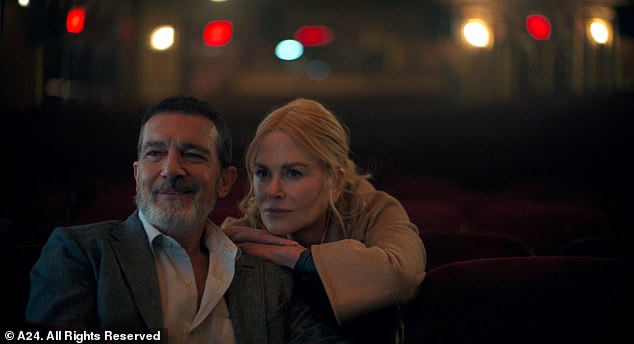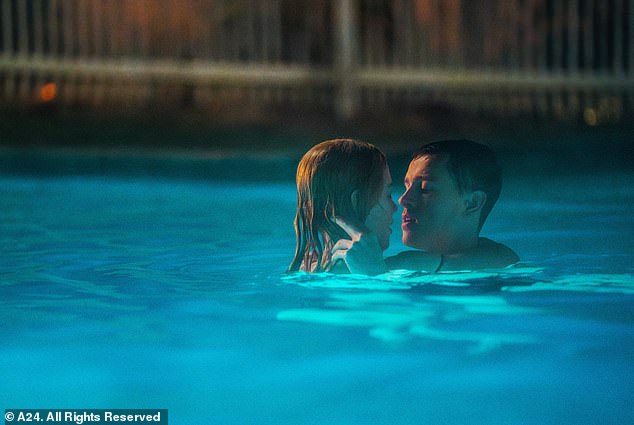BRIAN VINER reviews A Real Pain: A masterpiece from the heir to Woody Allen
A real pain (15, 90 minutes)
Verdict: Really great
Jesse Eisenberg has said that he was inspired to write A Real Pain after coming across an online advertisement promoting tours of the Auschwitz concentration camp, which included lunch.
He has turned that darkly comic irony – the unconscious but screaming dissonance between the monumental evil and human misery implied by one word, Auschwitz, and the lavish comforts of modern tourism – into a truly beautiful film.
A Real Pain is loudly funny, quietly witty, painfully sad and excruciatingly well observed. That’s quite a trick to pull off in an hour and a half.
Eisenberg plays David, with Kieran Culkin (recently anointed with a Golden Globe for his brilliant performance) as his cousin Benji.
New York Jews, born just a few weeks apart, have always been close, despite their personality differences, not to mention their abortive disorders.
David, married with a son, is obsessive-compulsive, socially anxious and introspective. Benji is single, social and charismatic. He is also hyperactive and deeply troubled, with attention deficit problems.
Will Sharpe (left) and Jesse Eisenberg (right) as their characters James and David and in a scene from A Real Pain

Kieran Culkin (left) and Jesse Eisenberg (right) as their characters Benji and David in A Real Pain
We meet them as they prepare to leave for Poland, where they will take part in a ‘Holocaust tour’ as a way to honor their grandmother Dory, a survivor, who recently passed away.
They plan to cut the tour short in the last few days to find the house where Dory lived before she was taken to the camps.
The two contrasting personality types offer Eisenberg countless opportunities for both poignancy and comedy, which he exploits beautifully.
He and Culkin, who in some ways plays an even more unpredictable version of Roman Roy, his character in the TV hit Succession, are entirely believable as loving cousins, although David, eternally jealous of Benji’s magnetism, also finds him utterly irritating. “I love him, I hate him, I want to kill him, I want to be him,” he tells the others in the group.
They are also perfectly written and cast. Will Sharpe (The White Lotus) is particularly glorious as James, the friendly, non-Jewish tour guide from the north of England, who is reproached by Benji at a cemetery for being too talkative.
That’s rich, coming from him, but then Culkin gets to the bottom of the contradictions in Benji, gleefully trampling on people’s sensitivities, yet with his own hair-trigger sensitivities.
It’s only Benji who feels uncomfortable with a group of 21st century American Jews traveling first class on a Polish train.
He declares that he is moving to a standard class compartment. “I don’t think you will experience much suffering there either,” says one of his traveling companions wryly.

Jennifer Gray as her character Marcia in a scene from Jessie Eisenberg’s film A Real Pain
Excluding James, there are six on the tour, all Americans except for an African man, Eloge (Kurt Egyiawan), who lost family members during the Rwandan genocide, moved to Canada and converted to Judaism.
He’s apparently modeled after a friend of Eisenberg’s, who plundered his own life and legacy to make this film.
The modest house where his Polish-born great-aunt once lived is used as Grandma Dory’s childhood home.
Pulling so hard on his roots is one of the many ways Eisenberg has become Woody Allen’s heir apparent, both on screen as the smart, neurotic, weedy Jewish New Yorker (not much of a challenge by any means), and now as a writer and director.
Not everyone will take that as praise, but if you cherish Allen’s best films, such as Annie Hall (1977) and Hannah And Her Sisters (1986), then you will love A Real Pain.
I cherished every one of the ninety minutes – and what a lesson, by the way, in the economics of storytelling. Allen was always good at that too.
This is the movie he might wish he had made, and might even have made, except that it has a lot more heart and tenderness than most of them. It’s a small masterpiece.
Baby Girl (18, 114 minutes)
Verdict: Smart and snappy
The same claim can’t be made for Babygirl, and it’s not without some narrative silliness, but on the whole it’s a smart, racy, psychosexual thriller starring Nicole Kidman as Romy, a corporate hottie who appears to be happily married to Jacob (Antonio Banderas). , a theater director, but then falls hard for one of her company’s new interns, the cunning, supremely confident Samuel (Harris Dickinson).
However, writer-director Halina Reijn’s film is not just the story of an illegal office affair across the age limit. Much more interesting is that it is also about power and politics in the workplace.

Nicole Kidman as Romy, a business hotshot who appears to be happily married to Jacob (Antonio Banderas)

But then she falls hard for one of her company’s new interns, the cunning, supremely confident Samuel (Harris Dickinson).

Nicole Kidman as Romy and Harris Dickenson as Samuel during a spicy scene in Babygirl
Samuel senses that Romy, whose job it is to tell others what to do, has a kinky desire to be the one who immediately follows orders.
So the CEO and the intern switch roles; the boss becomes the boss.
Both leads are excellent, especially Kidman. She describes it as the most ‘exposing’ performance she has ever given, which considering 1999’s Eyes Wide Shut is quite something.
And Banderas, who has been nobody’s idea of a cuckold for most of his career, provides top-notch support.
As for the almost untold, the so-called cosmetic work that sometimes seems to limit Kidman’s range of expressions from just A to about C, that is cleverly woven into the story.
Romy is clearly the kind of woman who would become a friend of Botox. So if you need an injection yourself in this frigid January of heat and steam, give Babygirl a try.
The biopic of brooding Calla made me long for the fat lady to sing
Maria (12A, 124 minutes)
Verdict: One-note biopic
Pablo Larrain’s biopic of revered opera singer Maria Callas, played with talent by Angelina Jolie, is the third in his trilogy about three of the most iconic women of the 20th century (Jackie Kennedy and Princess Diana were the other two).
Larrain prefers to portray his subjects in their most tortured and miserable form, which for Callas means the last months of her life, when in her torrid dreams she continues to see her deceased lover, shipping magnate Aristotle Onassis, as she desperately tries regain her famous singing voice. .
Unfortunately, this means that she spends most of the film (written by Steven ‘Peaky Blinders’ Knight) as a self-pitying, endlessly needy shell of the woman who terrified even combative film director John Huston.
He once said he would rather go six rounds with former heavyweight champion Jack Dempsey than cross swords with Callas.
Maria certainly has its moments, and Jolie is very good, but I found it bleak. Honestly, I was longing for the fat lady to sing long before she even started gargling.
All films are now in cinemas.
